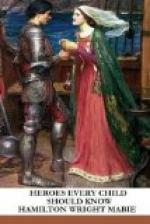Now, this Robert the Bruce was held the best warrior in Scotland. He was very wise and prudent, and an excellent general; that is, he knew how to conduct an army, and place them in order for battle, as well or better than any great man of his time. He was generous, too, and courteous by nature; but he had some faults, which perhaps belonged as much to the fierce period in which he lived as to his own character. He was rash and passionate, and in his passion he was sometimes relentless and cruel.
Robert the Brace had fixed his purpose, as I told you, to attempt once again to drive the English out of Scotland, and he desired to prevail upon Sir John, the Red Comyn, who was his rival in his pretensions to the throne, to join with him in expelling the foreign enemy by their common efforts. With this purpose, Bruce requested an interview with John Comyn. They met in the Church of the Minorites in Dunfries, before the high altar. What passed betwixt them is not known with certainty; but they quarrelled, either concerning their mutual pretensions to the Crown, or because Comyn refused to join Bruce in the proposed insurrection against the English; or, as many writers say, because Bruce charged Comyn with having betrayed to the English his purpose of rising up against King Edward. It is, however, certain, that these two haughty barons came to high and abusive words, until at length Bruce forgot the sacred character of the place in which they stood, and struck Comyn a blow with his dagger. Having done this rash deed, he instantly ran out of the church and called for his horse. Two friends of Bruce were in attendance on him. Seeing him pale, bloody, and in much agitation they eagerly inquired what was the matter.
“I doubt,” said Bruce, “that I have slain the Red Comyn.”
“Do you leave such a matter in doubt?” said one, “I will make sicker!”—that is, I will make certain. Accordingly, he and his companion rushed into the church and made the matter certain with a vengeance, by dispatching the wounded Comyn with their daggers. His uncle, Sir Robert Comyn, was slain at the same time.
This slaughter of Comyn was a rash and cruel action. It was followed by the displeasure of Heaven; for no man ever went through more misfortunes than Robert Bruce, although he at length rose to great honour. After the deed was done, Bruce might be called desperate. He had committed an action which was sure to bring down upon him the vengeance of all Comyn’s relations, the resentment of the King of England, and the displeasure of the Church, on account of having slain his enemy within consecrated ground. He determined, therefore, to bid them all defiance at once, and to assert his pretensions to the throne of Scotland. He drew his own followers together, summoned to meet him such barons as still entertained hopes of the freedom of the country, and was crowned King at the Abbey of Scone, the usual place where the Kings of Scotland assumed their authority.




